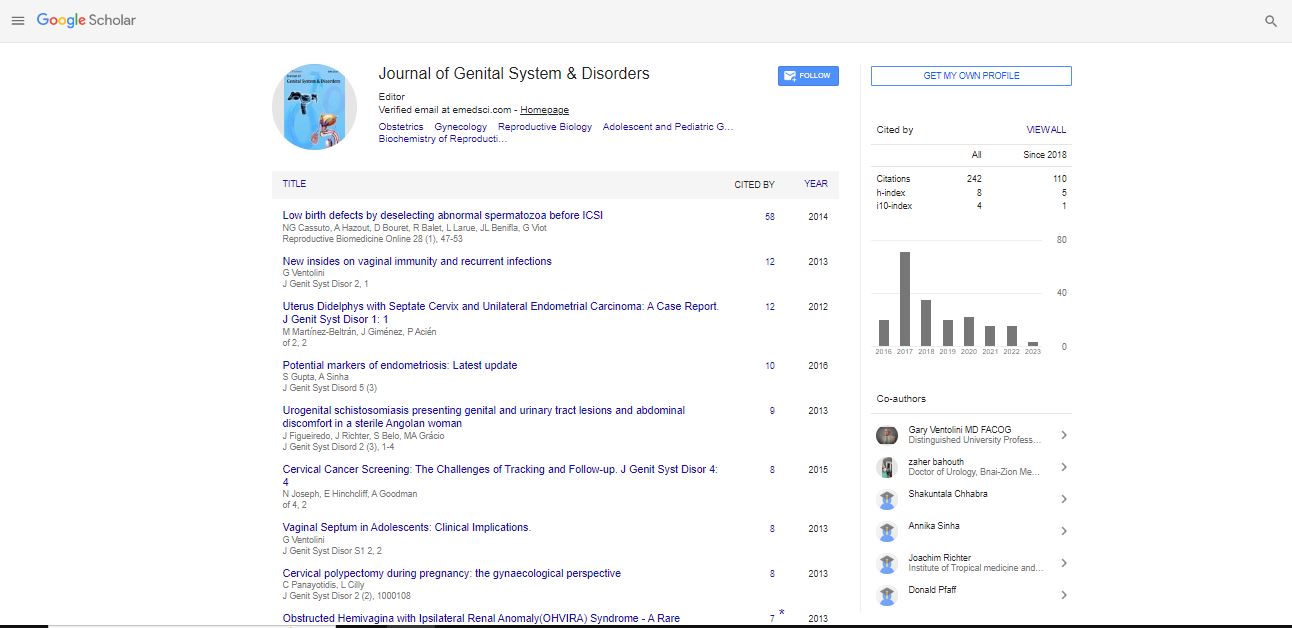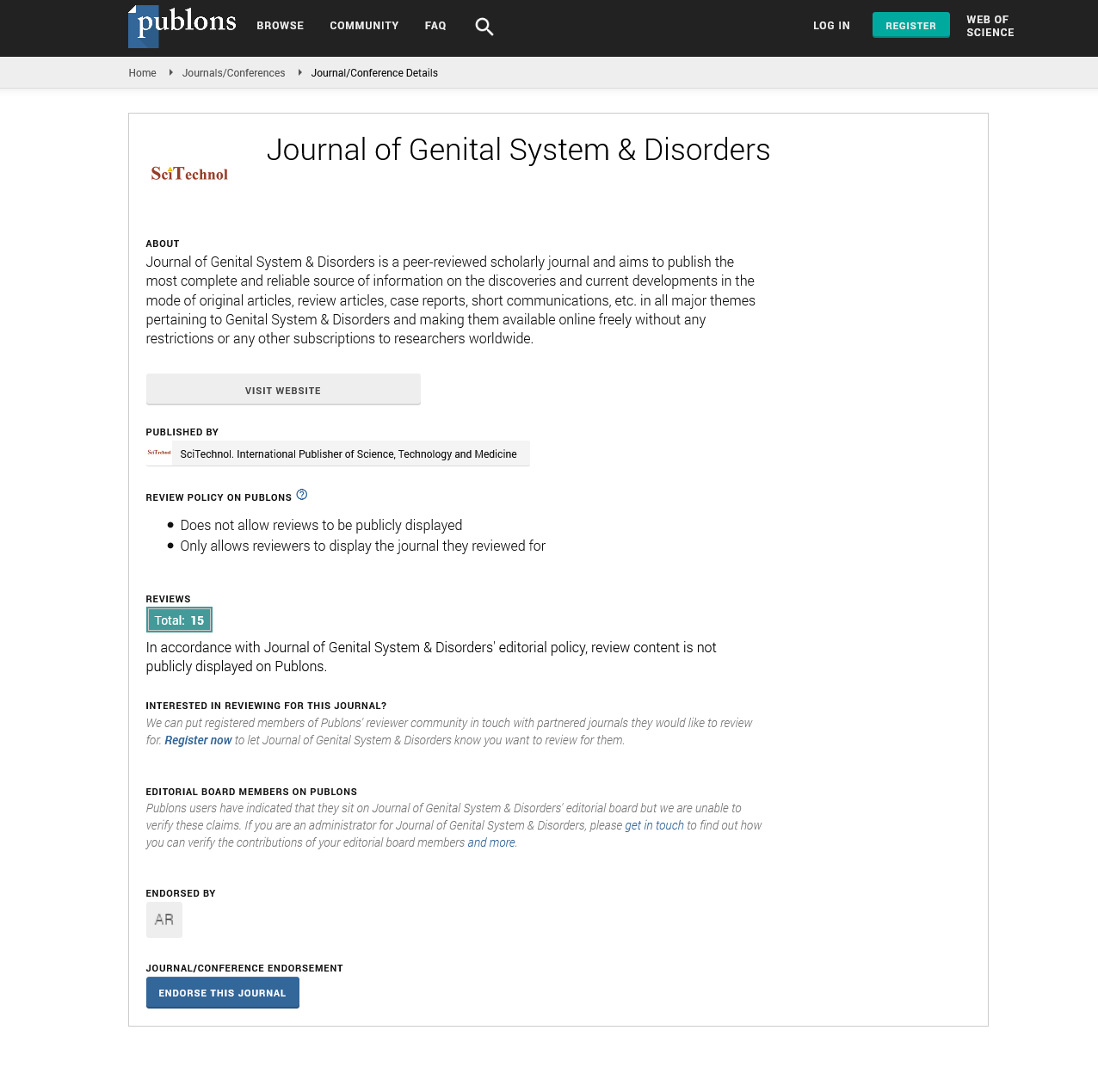Perspective, Vol: 14 Issue: 1
Influence of Epigenetics on Reproductive Health and Fertility
Christopher Taylor*
Department of Reproductive Biology, Yale University, Connecticut, USA
*Corresponding Author: Christopher Taylor
Department of Reproductive Biology, Yale University, Connecticut, USA;
E-mail: Christophertaylor@yale.edu
Received date: 02 March, 2024, Manuscript No. JGSD-24-128700;
Editor assigned date: 04 March, 2024, QC No. JGSD-24-128700 (PQ);
Reviewed date: 18 March, 2024, QC No. JGSD-24-128700;
Revised date: 03 March, 2025, Manuscript No. JGSD-24-128700 (R);
Published date: 10 March, 2025, DOI: 10.4172/2325-9728.1000284
Citation: Taylor C (2025) Influence of Epigenetics on Reproductive Health and Fertility. J Genit Syst Disord 14:1
Description
Epigenetics has emerged as a captivating field within reproductive science, offering insight into how environmental and lifestyle factors can shape reproductive health and fertility. This article explores the intricate interplay between epigenetic modifications and their profound impact on reproductive biology.
Understanding epigenetics: Epigenetics refers to modifications to DNA and associated proteins that can regulate gene expression without altering the underlying DNA sequence. These modifications include DNA methylation, histone modifications, and non-coding RNAs, all of which play pivotal roles in determining which genes are switched on or off within cells. The dynamic nature of these epigenetic marks allows cells to adapt and respond to environmental cues, influencing various biological processes, including reproduction.
Epigenetics and gametogenesis: The process of gametogenesis, involving the production of sperm and eggs, is heavily influenced by epigenetic mechanisms. During gametogenesis, extensive epigenetic reprogramming occurs, ensuring the erasure of previous epigenetic marks and establishment of new ones. Disruptions in this reprogramming process can lead to epigenetic abnormalities, impacting the quality and function of gametes. Research in this area seeks to unravel how epigenetic dysregulation during gametogenesis contributes to infertility and developmental disorders.
Impact on fertility and pregnancy: Epigenetic modifications are known to influence fertility in both males and females. In males, aberrant DNA methylation patterns have been linked to impaired sperm quality and infertility. Similarly, in females, epigenetic alterations in oocytes can compromise fertility and contribute to pregnancy complications. Studies are delving into the epigenetic signatures associated with conditions such as Polycystic Ovary Syndrome (PCOS), endometriosis, and recurrent pregnancy loss, shedding light on potential epigenetic biomarkers and therapeutic targets.
Environmental exposures and epigenetic reprogramming: Environmental factors, including diet, stress, and exposure to endocrine-disrupting chemicals, have been shown to impact epigenetic programming in reproductive tissues. Prenatal and early-life exposures to these factors can induce lasting changes in the epigenome, influencing fertility and reproductive outcomes in adulthood. Understanding the epigenetic effects of environmental exposures is crucial for developing strategies to mitigate their negative impact on reproductive health.
Intergenerational epigenetic inheritance: Emerging evidence suggests that epigenetic modifications acquired during one's lifetime can be transmitted to future generations. This phenomenon of intergenerational epigenetic inheritance raises thought-provoking questions about how parental experiences and exposures can shape the health and fertility of offspring. Research endeavors are aimed at elucidating the mechanisms underlying intergenerational epigenetic inheritance and assessing its implications for reproductive health across generations.
Therapeutic implications and future directions: Insights gleaned from the intersection of epigenetics and reproductive health hold promise for the development of novel diagnostic tools and therapeutic interventions. Epigenetic profiling may offer valuable predictive markers for assessing fertility potential and assessing pregnancy risks. Additionally, epigenetic-based interventions, such as epigenetic reprogramming strategies and targeted epigenetic therapies, are being explored to address reproductive disorders and improve fertility outcomes.
In conclusion, the burgeoning field of epigenetics has unveiled a fascinating dimension to our understanding of reproductive health and fertility. Research into epigenetic modifications and their impact on gametogenesis, fertility, and intergenerational inheritance is reshaping the landscape of reproductive biology. By unraveling the epigenetic underpinnings of reproductive health, we stand to gain profound insights that could ultimately pave the way for more personalized and effective approaches to addressing infertility and optimizing reproductive outcomes.
 Spanish
Spanish  Chinese
Chinese  Russian
Russian  German
German  French
French  Japanese
Japanese  Portuguese
Portuguese  Hindi
Hindi 
